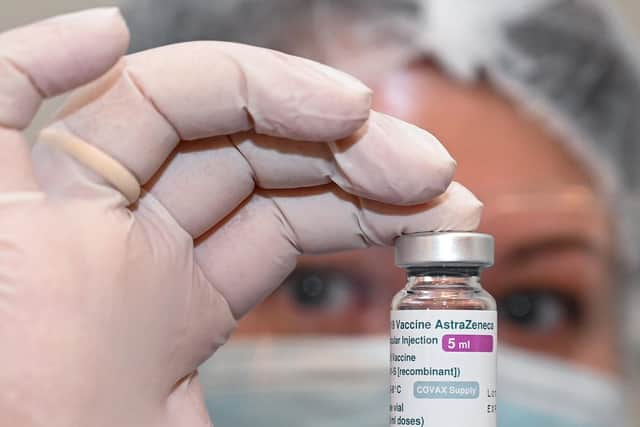Should people be worried about the Oxford/AstraZeneca vaccine?
and live on Freeview channel 276
It comes amid reports of a small number of people developing blood clots after having the jab.
Here we take a look at the key questions surrounding the situation.
– What has happened?


Advertisement
Hide AdAdvertisement
Hide AdThere have been a small number of reports of people experiencing blood clots in the days and weeks after their vaccination.
The European Medicines Agency (EMA) reported one person in Austria was diagnosed with blood clots and died 10 days after vaccination, but it stressed there is “currently no indication that vaccination has caused these conditions”.
Last week the World Health Organisation (WHO), (EMA) and the UK’s Medicines and Healthcare products Regulatory Agency (MHRA) said there was no evidence of a link between the vaccine and an increased risk of blood clots.
– Which countries have suspended rollout?
On Monday Italy, France and Germany said they would be suspending distribution of the jab, joining the Republic of Ireland, Denmark, Norway, Bulgaria, Iceland and Thailand.
Advertisement
Hide AdAdvertisement
Hide AdFrench president Emmanuel Macron said the country was making the move as a precaution.
– What do the regulators say?
The EMA has again insisted the benefits of the Oxford/AstraZeneca Covid-19 vaccine outweigh the potential side effects.
It said events involving blood clots, some with unusual features such as low numbers of platelets, have occurred in a very small number of people who received the vaccine, but that thousands of people develop blood clots annually in the European Union for different reasons.
The MHRA issued a statement last week saying more than 11 million doses of the AstraZeneca vaccine had been administered across the UK with no issues.
Advertisement
Hide AdAdvertisement
Hide AdLast week the International Society on Thrombosis and Haemostasis (ISTH) recommended that all eligible adults continue to receive their Covid-19 vaccinations.
– What happens next?
The EMA’s safety committee (PRAC) will further review the information on Tuesday and has called an extraordinary meeting on Thursday to conclude on the information gathered and any further action that may need to be taken.
If an increased association is found with vaccination, then attempts to understand the mechanism usually follow – so as to avoid similar problems in the future.
– Are UK scientists worried, and what does this mean for vaccine hesitancy?
Advertisement
Hide AdAdvertisement
Hide AdNo. Scientists in the UK say there is no data to directly link the vaccine and the blood clots.
Dr Michael Head, senior research fellow in global health, University of Southampton, said the decisions to halt the rollout “look baffling”.
He added that the suspension during a pandemic has consequences, resulting in delays in protecting people, and the potential for increased vaccine hesitancy.
Dr Stephen Griffin, associate professor in the school of medicine, University of Leeds, said nationwide gestures such as this are bound to fuel hesitancy, or more extreme anti-vaccine sentiment, further undermining the vaccination effort.
Advertisement
Hide AdAdvertisement
Hide AdOthers have said that while it is right that any possible links between serious adverse reactions to a vaccine are investigated, it is important to establish the likelihood of causation, as opposed to association.
– Does it make a difference who has been getting the vaccine?
Experts have said it is likely that the early stages of the European rollout have primarily comprised elderly and more clinically vulnerable patients, which might be expected to have a much higher incidence of random clotting-related events.
– What has AstraZeneca said?
AstraZeneca also said its own review had found no evidence of an increased risk of pulmonary embolism, deep vein thrombosis (DVT) or thrombocytopenia, in any defined age group, gender, batch or in any particular country.
Advertisement
Hide AdAdvertisement
Hide AdIn clinical trials for the jab, the number of clotting incidents was small and “lower in the vaccinated group” than in those who were unvaccinated, it added.
– Hasn’t the EU had issues with supply of the AstraZeneca vaccine?
The EU has been unhappy with AstraZeneca because the company is delivering far fewer doses to the bloc than it promised.
Of the initial order for 80 million doses first quarter this year, the pharmaceutical company will be struggling to deliver half that number.
Advertisement
Hide AdAdvertisement
Hide AdAccording to the European Centre for Disease Prevention and Control, Germany has received slightly more than three million doses of the AstraZeneca vaccine and only used 1.35 million doses so far.
It is thanks to our loyal readers that we can continue to provide the trusted news, analysis and insight that matters to you. For unlimited access to our unrivalled local reporting, you can take out a subscription here and help support the work of our dedicated team of reporters.